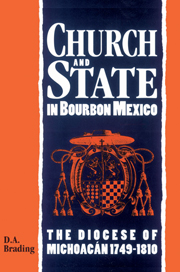7 - Confraternities and parochial income
Published online by Cambridge University Press: 01 February 2010
Summary
In 1775 the royal accountant of community funds discovered that many Indian villages lacked any collective fund because their lands, capital and cattle had been absorbed by confraternities and brotherhoods whose income was devoted to ‘church ceremonies, dinners, fireworks and other useless and harmful things’. Not only were the Indians themselves often reduced to poverty by such expenses, but at times royal tributes could not be collected. On learning of these abuses, the crown attorney, Juan Antonio de Areche, called for measures to end this evil by abolishing the confraternities and returning their property to the village. In the same vein, the bishop of Oaxaca recommended that each village should be allowed only one brotherhood (hermandad) in which all adults were to be enrolled, with a small charge made for the upkeep of the local church and its liturgy.
Once alerted to the existence of innumerable popular organisations, about which the crown possessed virtually no record, in 1776 ministers in Madrid issued a rescript which declared that all confraternities required a royal licence and that their constitutions should be inspected to ensure they conformed with royal policy. It was later emphasised that these organisations were temporal rather than spiritual in character and that their property was subject to royal rather than ecclesiastical jurisdiction. Over 500 copies of a rescript of 1791 were circulated which stringently prohibited confraternities or any similar body from meeting without a royal official present.
- Type
- Chapter
- Information
- Church and State in Bourbon Mexico , pp. 131 - 149Publisher: Cambridge University PressPrint publication year: 1994



